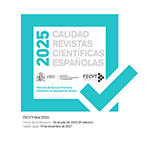The development of the epistemology in medieval Islamic "kalām"
Abstract
In this study I will deal with epistemology, especially in terms of classification and definition of the sources of knowledge among the theologians of rationalist Islamic schools (mutakallimūn), which appeared at the beginning of the Abbasid caliphate (half of the 10th century). What kind of knowledge was considered as valid for the exegesis of the sacred text became one of the most important and polemic topics in mediaeval Islamic theology. The debate around different types of knowledge gave rise to highly controversial philosophical questions, among which figure the following: “How do we know the existence of God and his unicity?” “Which is the knowledge that allows us to discern between the true and the false and between the acceptable and the reprehensible?” With the aim to tackle this issue, I will deal with the models of classification and sorts of knowledge, both among the mutakallimūn who devoted themselves to philosophy and those devoted to jurisprudence. Within these groups, I will stop to comment their internal differences and opinions on this matter.
Downloads
Article download
License
In order to support the global exchange of knowledge, the journal Anaquel de Estudios Árabes is allowing unrestricted access to its content as from its publication in this electronic edition, and as such it is an open-access journal. The originals published in this journal are the property of the Complutense University of Madrid and any reproduction thereof in full or in part must cite the source. All content is distributed under a Creative Commons Attribution 4.0 use and distribution licence (CC BY 4.0). This circumstance must be expressly stated in these terms where necessary. You can view the summary and the complete legal text of the licence.










